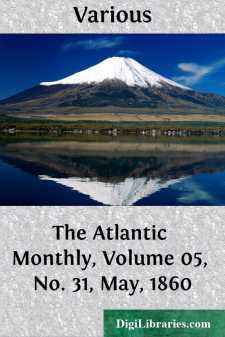Categories
- Antiques & Collectibles 13
- Architecture 36
- Art 48
- Bibles 22
- Biography & Autobiography 813
- Body, Mind & Spirit 142
- Business & Economics 28
- Children's Books 17
- Children's Fiction 14
- Computers 4
- Cooking 94
- Crafts & Hobbies 4
- Drama 346
- Education 46
- Family & Relationships 57
- Fiction 11829
- Games 19
- Gardening 17
- Health & Fitness 34
- History 1377
- House & Home 1
- Humor 147
- Juvenile Fiction 1873
- Juvenile Nonfiction 202
- Language Arts & Disciplines 88
- Law 16
- Literary Collections 686
- Literary Criticism 179
- Mathematics 13
- Medical 41
- Music 40
- Nature 179
- Non-Classifiable 1768
- Performing Arts 7
- Periodicals 1453
- Philosophy 64
- Photography 2
- Poetry 896
- Political Science 203
- Psychology 42
- Reference 154
- Religion 513
- Science 126
- Self-Help 84
- Social Science 81
- Sports & Recreation 34
- Study Aids 3
- Technology & Engineering 59
- Transportation 23
- Travel 463
- True Crime 29
The Atlantic Monthly, Volume 05, No. 31, May, 1860
by: Various
Categories:
Description:
Excerpt
INSTINCT.
"Instinct is a great matter," quoth Falstaff, when called upon to find out a device, a "starting-hole," to hide himself from the open and apparent shame of having run away from the fight and hacked his sword like a handsaw with his own dagger. Like a valiant lion, he would not turn upon the true prince, but ran away upon instinct. Although the peculiar circumstances of the occasion upon which the subject was presented to Falstaff's mind were not very favorable to a calm consideration of it, he was undoubtedly correct in saying that instinct is a great matter. "If, then, the tree may be known by the fruit," says Falstaff, "as the fruit by the tree, then, peremptorily I speak it, there is virtue in that Falstaff"; and it is proper that his authority should be quoted, even upon a question of metaphysical science.
That psychological endowment of animals which we denominate instinct has in every age been a matter full of wonder; and men of thought have found few more interesting subjects of inquiry. But it is confessed that little has been satisfactorily made out concerning the nature and limitations of instinct. In former times the habits and mental characteristics of those orders of animated being which are inferior to man were observed with but a careless eye; and it was late before the phenomena of animal life received a careful and reverent examination. It is vain to inquire what instinct is, before there has been an accurate observation of its manifestations. It is only from its outward manifestations that we can know anything of that marvellous inward nature which is given to animals. We cannot know anything of the essential constitution of mind, but can know only its properties. This is all we know even of matter. "If material existence," says Sir William Hamilton, "could exhibit ten thousand phenomena, and if we possessed ten thousand senses to apprehend these ten thousand phenomena of material existence, of existence absolutely and in itself we should be then as ignorant as we are at present." But this limitation of human knowledge has not always been kept in view. Men have been solicitous to penetrate into the higher mysteries of absolute and essential existence. But in thus reaching out after the unattainable, we have often passed by the only knowledge which it was possible for us to gain. Much vague speculation concerning instinct has arisen from the attempt to resolve the problem of its ultimate nature; and perhaps much more might have been made out with certainty about it, if no greater task had been attempted than to classify the phenomena which it exhibits and determine the nature of its manifestations. In regard to instinct, as well as everything else, we must be content with finding out what it seems to us to be, rather than what it is. Even with this limitation, the inquiry will prove sufficiently difficult. The properties of instinct are a little more inscrutable than those of the human mind, inasmuch as we have our own consciousness to assist us in this case, while we are left to infer the peculiarities of instinct from its outward manifestations only....












